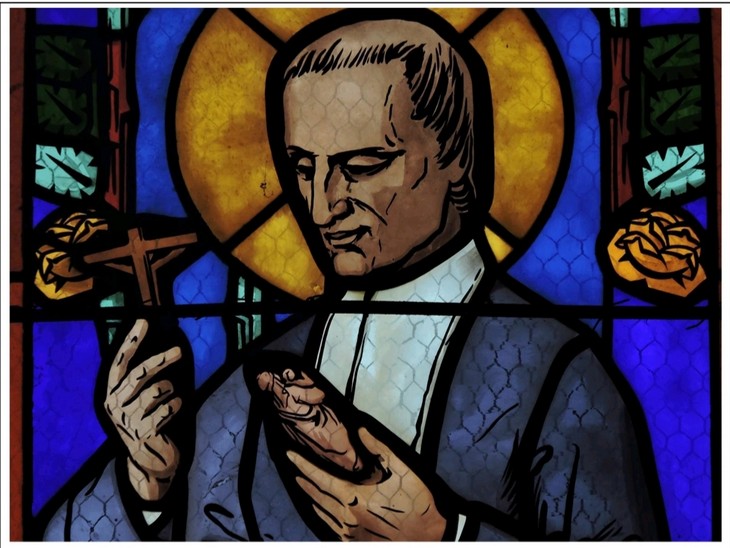 HOMILY: FEAST OF ST. LOUIS MARIE GRIGNION DE MONTFORT
HOMILY: FEAST OF ST. LOUIS MARIE GRIGNION DE MONTFORTPreacher: Fr. Aswani Kumar SMM
Every saint has a past and every sinner has a future. Yes, it is one such saint’s feast we celebrate today. I have always admired the life of St. Louis de Montfort whom Pope John Paul calls as the Apostle of the Holy Rosary. We Montfortians celebrate the birth of Montfort in Heaven 304 years ago. As I learned and read little about this holy saint of God I am touched by his faith, confidence in God, devotion, zeal, hatred of sin, love of penance love of the Cross, love for the poor, and his devotion to Blessed Virgin Mary.
From his earliest days, he showed signs of what he was to become one day; for he was still only four or five years of age when he was speaking of God, and going up to his mother when he saw her saddened to console her. We need not be rich to do charity. Montfort knowing himself being the poorest, used to help his classmates asking alms from the rich whom he would that they would help.
When he was studying his high school in Rennes there was a priest called M. Bellier, who used to gather together a certain number of students every week in his house, to give them talks on piety. Louis Grignion was one of the foremost and most regular in his attendance, and in passing on to others the practice of Christian and clerical virtues taught there. This priest used to send them after the talks on days off, in twos and threes, to serve the poor in the General Hospital and the Hospital for Incurables, by reading to them some good book during their meal and teaching them the catechism afterwards. Louis never failed to carry out these exercises. And this service instilled in Montfort a special love for the poor during his seminary days and even after becoming priest. Montfort always had two objects of charity.
· One to serve the poor and the other is
· To work for the salvation of the souls.
Looking at St. Montfort’s life with my little understanding and learning of this great saint I see in him a great counsellor who used the theories in his approach towards the people he met in life. And I find often St. Montfort using Person-Centered Therapy (PCT) much more before it came into existence. Karl Rogers the author of Person-Centered Therapy in 1940 encourages the client's personal growth. The core conditions in Person-Centered Therapy described by Rogers are Empathy, unconditional positive regard, and congruence of genuineness
- Empathy (to show compassion): It refers to the counselor’s ability to understand the client at a deeper level.
Here I find Montfort realizing the need of the Church, to renew the faith of the people who are tossed by different scandals, heresies, and worldly desires. Montfort with his Holy Passion preached missions and renewed the baptismal promises and won many souls for God.
- Unconditional Positive regard: People need acceptance, respect, and warmth from others but unfortunately these attitudes and feelings are often given conditionally. Rogers believed that counselors should convey unconditional positive regard or warmth towards clients if they are to feel understood and accepted.
Montfort expressed his unconditional positive regard to the poor, whom he gave the status as his brothers and sisters; to the people who misunderstood him, to the people who ill-treated him and to the people who let him down.
Montfort's unconditional love for the poor earned him the title “The Bursar of the poor” during his service at Poitiers. The poor inmates of the General Hospital, who had already had the experience of the charity of
Montfort, never ceased making their appeals and prayers to God to ask for him, and their prayers were heard when they least expected it, for the administrators begged him to take the position of Director, which had become vacant His detachment, his mortification and the love he had for them were immediately evident, for, not only did he refuse to accept the stipends normally paid to the other directors, but he chose for himself the poorest of all the rooms in the hospital, where it was the custom to place those infected with contagious diseases. He forbade them to give him any other food but that given to the servants; often he would even eat with the poor and from their leftovers.
- Genuineness and Congruence: The counselor needs to be real and true in the relationship.
I found true genuineness in the life of Montfort when it comes to his spiritual life. His love for the eternal Incarnate Wisdom, his genuineness to his Priesthood, his utter dependence on the Providence of God, his love for the scripture, and his faithful devotion to the Holy Rosary.
He was genuine in accepting the crosses offered by the fellow priests and to the order of the Bishops to move from place to place.
For instance, when he went to the hospital of the Salpêtrière, half a league from Paris, to serve the poor inmates, who numbered from 4 to 5 thousand, and to work for the salvation of souls: the two great objects of his charity. It is impossible to conceive of how much trouble and bustle he imposed on himself to instruct those who were ignorant of the truths of salvation, to save from sinful habits those who had been sunk in them for several years, to help the just to advance in the paths of virtue, to console the afflicted and to give to all an exalted sense of God and the enormity of sin. But due to jealousy of some administrators who could not stomach his good conduct complained to the authority managed to remove without Montfort’s knowledge, where he found his dismissal in writing one evening under his plate when he sat down at the table to eat a morsel of bread.
Before leaving, he gave away all his bits of furniture and everything he had to the poor, and exchanged a new hat he had been given for the old one worn by the door-keeper, and, following the gospel, shook the dust from his feet on leaving that place that God had brought him to, but the world forced him to leave.
Looking from the point of this Rogerian therapy I see Montfort as a person who always had
1. Vision: To make Christ known and to live a holy life. To preach missions and spread the Devotion to Mary. As (2 Cor:4:5) says “For we do not proclaim ourselves; we proclaim Jesus Christ as our Lord and ourselves as slaves for Jesus’ sake.”
2. Desire: Zeal to be a missionary. Where he was declared as Apostolic missionary by Pope Clement XI. MT:4:19-20 says to (Peter and Andrew) “And he said to them, “Follow me, and I will make you fish for people.” Immediately they left their nets and followed him.
3. Belief: He strongly believed in the Providence of God and the intercession of Mary. “Where he says “If you ever feel distressed during your day, call upon Our Lady- Just say this simple prayer: Mary Mother of Jesus, please be a mother to me now” where he admits that this prayer has never failed him. Lk:10:27 says ´You, shall love the Lord your God with all your heart and with all your soul, and with all your strength, and with all your mind and your neighbor as yourself.”
4. Acceptance: Montfort loved God than any otherworldly thing, therefore he accepted any kind of cross, be it poverty, mortification, fasting, transfer from place to place. The very instance of the order of Bishop not to inaugurate the Calvary he built in the parish of Pontchâteau. MT: 16:24 says “then Jesus told his disciples, “ If any want to become my followers, let them deny themselves and take up their cross and follow me.”
5. Intention: His intention was clear to live a humble and obedient life; no property only poverty. MT: 19:29 says “and everyone who has left houses or brothers or sisters or father or mother or children or fields, for my name’s sake, will receive a hundredfold, and will inherit eternal life.”
6.Action: He is convinced of his call and his mission and therefore he sought Liberos free men after the will of God. Founded Congregations to serve different needs of the society. (Mark 16:15) says “Go into all the world and proclaim the good news to the whole creation.”
To conclude:
There are three extraordinary things happened during his in Poitiers, which cause him to be looked like a saint
The first was that in 1706, around Shrove Tuesday, M. de Montfort, having gone to the college to make his confession, his director, Jesuit Father de La Tour, asked him after his confession where he was going to say Mass. M. de Montfort replied that, if he wished, he would say it in their church. Father de la Tour then asked him to say the Mass for Madame d’Armagnac, the wife of the Governor and King’s Lieutenant of Poitiers, who was terminally ill and given up by the doctors. Montfort promised him he would, and, after the Mass went to tell Fr. de la Tour that she would not die of this illness; that he had prayed to the Lord for her.
The second event was that having a particular devotion to St. John the Evangelist, he undertook to rebuild the church dedicated to God under the name of this apostle, which was in ruins, for it was so ancient that tradition in the town still claims that it had been used as a temple to false gods. There you can see a big stone sculpted in the form of a vase, which, they say, was used to receive the blood from animals sacrificed to the idols. It did not matter what people said to M. Grignion to the effect that he would never finish this undertaking. The dean of the Cathedral said to him one day, making fun of him: “Is it not true, M. Grignion that you have been transported to the Island of Patmos, and that God has revealed to you that he wants you to rebuild the church of St. John?” “Say what you like, Monsieur,” replied M. Grignion, “but I will finish it with God’s help.” He made a collection around the town, which yielded about 400 livres, and, having received more unexpected help which Providence sent his way, he succeeded in repairing this church, so to speak, from top to bottom.
The third event was that one day, Montfort, who was due to preach in the parish church of the Resurrection where he had given a mission, told those people who normally came to listen to him in the church of the Penitents about this. No matter how much they were told that he was not to give a sermon at the Penitents that day, the people were determined to stay. Among this crowd of people, there were several in the audience who, fearing that they would be deprived of the Word of God, prayed fervently to Our Lord, by the intercession of the Blessed Virgin. A short time later, people were surprised to see Fr. De Montfort coming in. He began by standing at the sacristy door and saying something to this effect: “In this church, there are some people who asked God that I come to preach, and I was pressed into doing the opposite of what I had proposed; but if you do not profit by this, God will demand an exact and rigorous account from you on the day of judgment.” Then he gave his sermon.
May the perfect love of God reign in our hearts!
